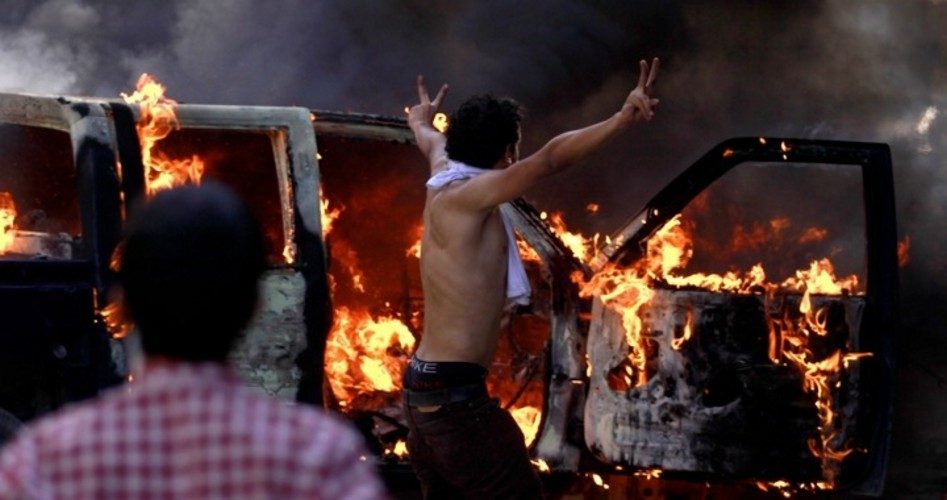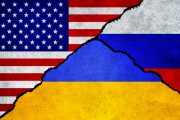
While acknowledging “true democracy — real freedom — is hard work,” President Barack Obama told the General Assembly of the United Nations on September 25 that the world is in a “season of progress” toward that goal.
“So let us remember that this is a season of progress,” the president said, despite recent turmoil that included the killing of the American ambassador and three other U.S. diplomats in an armed attack on the U.S. consulate in Benghazi, Libya, the storming of the U.S. embassy grounds and desecration of the American flag in Cairo, and anti-American demonstrations and flag burnings in numerous capitals in the Middle East. Obama pointed to the “Arab Spring” and the popular uprisings that have resulted in the overthrow of dictatorships in that part of the world.
“For the first time in decades, Tunisians, Egyptians, and Libyans voted for new leaders in elections that were credible, competitive, and fair,” Obama said, while also hailing “peaceful transitions of power in Malawi and Senegal, and a new President in Somalia. In Burma, a President has freed political prisoners and opened a closed society; a courageous dissident has been elected to Parliament; and people look forward to further reform. Around the globe, people are making their voices heard, insisting on their innate dignity, and the right to determine their future.”
The president opened his remarks with a tribute to Christopher Stevens, the American ambassador killed in Libya.”As America’s representative, he helped the Libyan people as they coped with violent conflict, cared for the wounded, and crafted a vision for a future in which the rights of all Libyans would be respected,” Obama said, recalling the 54-year-old diplomat’s role in helping rebels who fought to overthrow Libyan strong man Moammar Gadhafi and establish a new government.”After the revolution, he supported the birth of a new democracy, as Libyans held elections, built new institutions, and began to move forward after decades of dictatorship.”
The attacks of the past two weeks on U.S. personnel and institutions, the American president told the world body, “are not simply an assault on America. They are also an assault on the very ideals upon which the United Nations was founded — the notion that people can resolve their differences peacefully; that diplomacy can take the place of war; and that in an interdependent world, all of us have a stake in working towards greater opportunity and security for our citizens.”
Obama stressed the role the United States has played in helping to reshape governments and social order in parts of Africa and the Arab world.
“We were inspired by the Tunisian protests that toppled a dictator, because we recognized our own beliefs in the aspirations of men and women who took to the streets,” he said. “We insisted on change in Egypt, because our support for democracy put us on the side of the people. We supported a transition of leadership in Yemen, because the interests of the people were not being served by a corrupt status quo. We intervened in Libya alongside a broad coalition, and with the mandate of the U.N. Security Council, because we had the ability to stop the slaughter of innocents; and because we believed that the aspirations of the people were more powerful than a tyrant.” Obama also repeated a call for a regime change in Syria.
“And as we meet here, we again declare that the regime of Bashar al-Assad must come to an end so that the suffering of the Syrian people can stop, and a new dawn can begin.
“We have taken these positions,” Obama said, “because we believe that freedom and self-determination are not unique to one culture. These are not simply American values or Western values — they are universal values. And even as there will be huge challenges that come with a transition to democracy, I am convinced that ultimately government of the people, by the people and for the people is more likely to bring about the stability, prosperity, and individual opportunity that serve as a basis for peace in our world.”
Obama’s view of “true democracy” as the universal cure for the world’s political ills and the natural goal of its social upheavals is strikingly at odds with the beliefs expressed by those who were architects of our constitutional republic, with its “checks and balances” to guard against both government oppression and the excesses of the popular will — which excesses James Madison called the “tyranny of the majority.” Far from being models of”stability, prosperity and individual opportunity,” democracies were viewed by Madison as “spectacles of turbulence and contention” that have “ever been found incompatible with personal security or the rights of property; and have in general been as short in their lives as they have been violent in their deaths” (Federalist, no. 10).
Madison expressed contempt for theoreticians who prescribed democracy as the cure for wars and internal strife. “Theoretic politicians, who have patronized this species of government,” he wrote, “have erroneously supposed that by reducing mankind to a perfect equality in their political rights, they would, at the same time, be perfectly equalized and assimilated in their possessions, their opinions, and their passions.”
Yet Obama, in his comments at the UN about the anti-Muslim video that has been cited as the proximate cause of the recent anti-American attacks and demonstrations, suggested that America’s respect for religious differences and freedom of expression could somehow be assimilated into the Muslim culture of the Arab world. Said the president:
It is time to heed the words of Gandhi: “Intolerance is itself a form of violence and an obstacle to the growth of a true democratic spirit.” Together, we must work towards a world where we are strengthened by our differences, and not defined by them. That is what America embodies, and that is the vision we will support.
Much of the Arab world does not share broadminded America’s acceptance of blasphemy in the name of diversity and tolerance. To millions of Muslims, blasphemy against Islam and its prophet is a crime that calls for vengeance against the people who perpetrate it and the societies that tolerate it. Given the opportunity to elect their own leaders, they are not likely to elect Jeffersonian Democrats with a mind toward tolerance of opposing views.
The George W. Bush administration insisted on elections in Gaza. The people elected the militant Hamas. The Obama administration “insisted on change in Egypt,” but the change we got was from a government that was, however dictatorial, friendly toward the United States to one that is dominated by the militantly anti-Western Muslim Brotherhood. In helping to topple Gadhafi, the United States and its coalition partners may have strengthened the hand of al-Qaeda terrorists in Libya, while fighting them at great expense elsewhere. And while the president may “declare again that the regime of Bashar al-Assad must come to an end,” he cannot declare with any assurance that the rebellion seeking to dispatch Assad will be any more tolerant of human rights or respectful of the values Obama proclaimed at the United Nations.
Indeed, most of the member states of the United Nations do not respect, much less embrace, those values, which makes the UN an odd forum for the kind of message the president was preaching. The people in much of the world appear determined not to have their future decided for them by either the United States or the United Nations. As columnist Pat Buchanan observed:
Bush II’s democracy crusade and Obama’s embrace of the Arab Spring have unleashed and empowered forces less receptive to America’s wishes and will than the despots and dictators deposed with our approval.
“With America headed for bankruptcy, with new debt of $1 trillion piled up each year,” Buchanan added, “perhaps John Quincy Adams’ counsel may commend itself to a country weary from a century of crusades.”
The columnist was referring to remarks made by Adams, then Secretary of State in a speech to the House of Representatives on July 4, 1821, the 45th anniversary of the Declaration of Independence. Speaking of the young republic’s role regarding the affairs of other nations, Adams said:
She has abstained from interference in the concerns of others, even when conflict has been for principles to which she clings, as to the last vital drop that visits the heart….
Wherever the standard of freedom and Independence has been or shall be unfurled, there will her heart, her benedictions and her prayers be.
But she goes not abroad, in search of monsters to destroy.
She is the well-wisher to the freedom and independence of all.
She is the champion and vindicator only of her own.
Photo of riots by U.S. embassy in Egypt: AP Images


